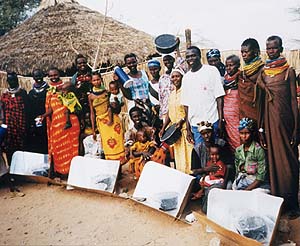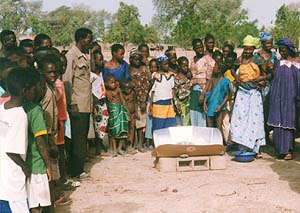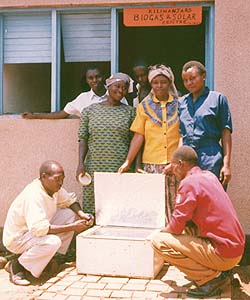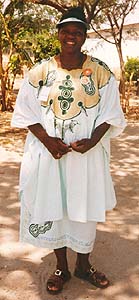move ahead on the path of the sun
|
1999 annual report |

|
ukiona wana sola
siku hii ni muhimu
songa mbele kidogo,
kidogo,
siku hii ni mihimu
if you see the solar people
it is an important day
move ahead a little, a
little,
it is an important day
(kiswahili and english lines in a song from kakuma refugee camp in kenya)
sci broke records in 1999 -- for training of new solar cooks in kakuma refugee camp and for sale of cookers and other educational material in the united states. these would be the signs of a very good year. however, we suffered a loss in the spring with the retirement of our founding executive director, ms. beverly blum. bev was largely responsible for building up sci from an idea shared by a handful of enthusiasts in arizona and california to today's organization with staff and field projects in several countries. thankfully, she remains an honored, active member of sci.
after an arduous search process, the sci board chose mr. terry grumley as our new executive director. terry comes to us with impressive experience in international development, including five years as country director in zambia for plan international, as well as 12 years working in latin america and the caribbean region. welcome, terry!
i extend the board's sincere gratitude to seven people who enabled sci to have such a good year despite a lengthy transition period: our full-time staff, margaret owino in nairobi, nadir aden hassen in ethiopia, kevin porter and virginia callaghan in sacramento, california, and our part-time assistants in sacramento, ram�n coyle and madeline moss. especially, many thanks to former sci president john collentine, who stepped in as our interim executive director.
we extend our deepest appreciation to sci's members/donors for rallying so wonderfully to this vital cause and keeping us moving ahead.
norge w. jerome, ph.d.
sci president, 1999
to our friends, members and supporters
i feel fortunate to have joined solar cookers international in the crucial work of directly improving thousands of peoples' lives and reducing environmental degradation. in these first months on the job, i have come to appreciate the organization's growing strengths and accomplishments.
in our refugee projects, sci is blessed with active volunteers and supportive community elders. solar cooking is widespread and accepted and is reducing families' dependence on fuelwood. our projects are well regarded and supported by the united nations high commissioner for refugees in ethiopia and kenya and also by lutheran world federation in kenya.
in zimbabwe, we are working with a respected, local, autonomous organization, the development technology centre of the university of zimbabwe, and have extended the solar cooking project from two communities to six.
sci's participatory style and sensitivity to local cultural concerns and interests is evident in many ways-from finding recipes that fit local food styles to innovating a solution to plastic litter in aisha refugee camp. the development of a water pasteurization indicator further demonstrates sci's innovative capacity.
sci members have built a solid organization that is making real headway in its global mission. our challenge in 2000 is to fine-tune our programs and reinforce our staff and management capacity so that we can fully respond to opportunities that arise in 2001 and beyond. i am glowing to be a part of sci on the path of the sun.
terry grumley
sci executive director
at their request, a group of blind refugees in kakuma received solar cooker training and cookers in 1999. said one of the trainees, "because of our condition, we cannot go round looking for firewood. it is difficult enough trying to walk around. however, now we just pick the cookit and take it out in the sun, and it cooks." a new dimension in our work with refugees!
 sci works in two refugee camps which are overseen by the united nations high
commissioner for refugees (unhcr). in kakuma i camp in kenya, sci works in
partnership with lutheran world federation (lwf), the camp managers. the
population in kakuma has grown, and changed, in the five years sci has been
there. in 1999, 5,900 additional families received cookers and training in their
use. a team of about 35 women and men refugees serve as solar cooking trainers
and monitors, led by shadrack alumai, project supervisor.
sci works in two refugee camps which are overseen by the united nations high
commissioner for refugees (unhcr). in kakuma i camp in kenya, sci works in
partnership with lutheran world federation (lwf), the camp managers. the
population in kakuma has grown, and changed, in the five years sci has been
there. in 1999, 5,900 additional families received cookers and training in their
use. a team of about 35 women and men refugees serve as solar cooking trainers
and monitors, led by shadrack alumai, project supervisor.
in aisha refugee camp, ethiopia, the population is smaller and much more stable. all 2,000 families have received cookers and training. "staff continue to undertake home visits and group discussions to popularize usage of the cookit and solve any problems," reports nadir aden hassen, sci's coordinator in ethiopia. nadir, recruited in 1999, works with a team of refugee solar cooking leaders, with elders and community leaders, and with our partner agency in aisha, the ethiopian government's administration for refugee and returnee affairs.
both projects are in the "maintenance" phase, focusing on building systems to provide supplies and encouragement for solar cooks and trainers in preparation for eventual local autonomy and sustainability after sci has moved on. the projects are well managed by sci's east africa representative margaret c.a. owino. margaret opened sci's east africa office in nairobi in 1999.
edith nyoni and jane khumalo are two top solar cooking trainers in ntabazinduna, zimbabwe, each having taught skills to well over 300 new solar cooks. in the zimbabwe project, skilled solar cooks receive training and certification as solar cooking trainers. they then organize and conduct solar cooking workshops and sell cookers within their communities. 3,200 cookers have been sold through 1999.
sci's partner is the development technology centre (dtc) of the university of zimbabwe, which works with a small network of support organizations. other groups active in the zimbabwe solar cooking network include the zimbabwe farmers union, aztrec (an alternative technology group in gutu), zimbabwe women's bureau, methodist women in epworth, hlekweni rural centre, girl guides and rotary clubs in bulawayo, ntabazinduna, matapos and plum tree. many more groups are asking for help to begin teaching solar cooking.
"solar cooking technology has been well received by the zimbabwean society," says norman mhazo, field projects coordinator for dtc. "a cooker pays for itself in less than two months..."
 sci's headquarters' staff fielded thousands of requests in 1999 for
information arriving from new and experienced solar cooker people in 80
countries. our answers included self-help manuals and project planning guides,
individual advice and responses to questions, and help in linking solar cooking
activists within various regions of the world. sci nearly doubled its sales of
educational materials over 1999. many people assisted by sci report on their
experiences on the path of the sun.
sci's headquarters' staff fielded thousands of requests in 1999 for
information arriving from new and experienced solar cooker people in 80
countries. our answers included self-help manuals and project planning guides,
individual advice and responses to questions, and help in linking solar cooking
activists within various regions of the world. sci nearly doubled its sales of
educational materials over 1999. many people assisted by sci report on their
experiences on the path of the sun.
"i would first of all thank sci for having shown me the great possibilities that exist to help people with such simple and easily made products...i have been doing demos and workshops and developing different types of cookers from locally available material...i talked to a couple of cardboard box manufacturers and fortunately one of them has agreed to make a sample of 100 cookits for me..." k.j., india
 "your idea is very clear-expertise should be built up by the
beneficiary, to make any achievement sustainable! once again, thank you for all
the encouragement, and we will keep in touch for more information." e.a.,
sri lanka
"your idea is very clear-expertise should be built up by the
beneficiary, to make any achievement sustainable! once again, thank you for all
the encouragement, and we will keep in touch for more information." e.a.,
sri lanka
"i have four ovens on display in my solar room...i go to schools, meetings of societies, sororities, food banks, and i interest people from all over...i have given out hundreds of duplicated sheets, 'how to make a solar oven.' i just passed my 91st birthday last week and hope to continue." t.e., united states
"over three thousand people were amazed to see how a simple solar cooker
works at mabiri agriculture show, held in mzimba district in northern
malawi...during the under five clinics, women are encouraged to pasteurize
drinking water and milk using the solar cooker to make sure children and parents
are free from water-borne diseases..." h.k., embangweni hospital solar
cooker team, malawi
sci has a unique track record of simple, yet highly effective innovations:
| 1976 | barbara kerr and sherry cole of arizona, develop the cardboard box-within-a-box solar cooker. their passion and vision leads to the 1987 founding of sci. |
| 1991 | sci develops the foldable box cooker for easy shipment to most points in the world. |
| 1992 | sci members fred barrett and dale andreatta come up with the wapi, a re-usable gauge that shows whether solar-heated water and milk has been pasteurized, using a soy wax that melts just above pasteurization temperatures. bob metcalf combined the wapi with an adapted water test kit, complementing the ability of solar cookers to pasteurize water and reduce the spread of water-borne diseases. |
| 1994 | a team of international volunteers working with sci perfect the cookit, so simple it can be produced in zimbabwe for about us $2 per unit. |
| 1999 | margaret owino, working with refugee weavers, introduces a system for improving life while cleaning up plastic scraps that litter the refugee camps. weavers in both aisha and kakuma apply their traditional skills to make baskets (pictured), mats, ropes, and other items. |
|
1999 advisors |
|||
| beverlee bruce, ph.d. | mark aalfs, usa | barbara kerr, rn, msw, usa | |
| c. jay campbell, ms | juan arriaga, costa rica | barbara knudson, ph.d., usa | |
| christopher gronbeck | prof. roger bernard, france | bob larson, usa | |
| linda helm krapf | david chikodzore, zimbabwe | al ligtenberg, usa | |
| norge jerome, ph.d. | don coan, usa | louise meyer, usa | |
| william lankford, ph.d. | sherry cole, usa | jeanne-marie moore, usa | |
| lorrie mccurdy, ma | john collentine, usa | faustine odaba, kenya | |
| robert metcalf, ph.d. | econ. fabiola cuvi ortiz, ecuador | wilfred pimentel, usa | |
| virginie mitchem | chancellor rajammal devadas, ph.d., india | edwin pejack, ph.d., usa | |
| shyam s. nandwani, ph.d. | tom duhain, usa | martha & michael port, usa | |
| barby pulliam | isaac c. ferguson, ph.d., usa | tungamirai rukuni, zimbabwe | |
| john roche | christopher flavin, usa | ing. pedro serrano, chile | |
| claude thau | mary frank, usa | g. cal setzer, usa | |
| elivra williams, ms | paul funk, ph.d., usa | clark & eleanor shimeall, usa | |
| sonia heptonstall, ph.d., switzerland | tom sponheim, ma, usa | ||
| gary hursh, jd, usa | roma stibravy, usa | ||
| joyce jett, switzerland | wendy vanden heuvel, usa | ||
| peter kariuki, kenya/usa | |||
revenues |
|
|
donations |
$280,949 |
|
grants & contracts |
25,079 |
|
sales & other |
68,623 |
|
total |
374,651 |
expenses |
|
|
africa programs |
124,448 |
|
education |
157,825 |
|
fund development |
49,709 |
|
administration |
46,704 |
|
total |
378,686 |
assets |
|
|
cash |
110,052 |
|
inventory & equipment |
12,534 |
|
investments |
43,012 |
|
endowment |
25,000 |
|
other |
31,627 |
|
total |
222,225 |
|
liabilities |
6,110 |
|
net assets 12/31/99 |
$216,115 |
full audited financial statements are available on request. sci is a member of interaction and meets all of its standards for private, voluntary organizations.
1999 grants
|
alternative gift markets |
$25,079.05 |
1999 foundation gifts $1500 and above
community foundation of greater memphis |
compton foundation |
jkw foundation |
thomas & donna stone foundation |
transamerica foundation |
william slaughter foundation |
sci gratefully acknowledges the global community for its continued support.
salient and immediate benefits of solar cooking to refugee women
it is true that women have been marginalized all over the world for many centuries, but the refugee woman is not only marginalized, she is also a victim of armed conflict which she neither caused nor understands. she has lost everything in terms of her ability to provide for her family from a familiar environment. she has lost many loved ones and her heartache is great. while in flight she may have sustained serious injuries, may have been raped, may be nursing a baby, and if she reaches a refugee camp safely, she will have acquired a larger family than what she originally had. in addition, she must now take up the task of being the family head and also continue her normal household tasks in a strange and inadequate surrounding. these tasks include, among others, the provision of water, shelter and domestic energy to satisfy all her dependents. this is a short preview of a refugee woman's tribulations...having worked with and shared with refugee women for two years gives me the moral courage and strength to relate their story. the benefits discussed below are their real life experiences...
"women solar cooks have testified to: better health due to the fact that solar cooking is hygienic and clean. incidences of eye, lung, and air passage diseases are lessened. they are happy since their families are healthier and happier with the clean food, safe drinking water and milk and even warm water for bathing. solar cooking is unattended, so it affords the women extra time, which they use for self-improvement and the acquisition of new useful skills. many users are now literate, while others have jobs outside the home to add to the family income. they also use the extra time to relax, visit relations and friends. since solar cooking is an outdoor activity, it has created a forum for close neighbours to exchange ideas, and to mind each other's cookits, thus enhancing mutual social responsibility.
"as there are no open fires, women are not worried about burns or fires getting out of control. refugee dwellings are clustered together and are made from twigs, plastic tents, pieces of cloth and palm thatches. should fire go out of control, it would be capable of burning many houses, and, of course, there are no fire engines. many people would suffer burns and loss of property, and this would mean that women would have to reconstruct the shelters...
"for a refugee who has to barter part of the family ration for fuel, it means more food, while the money saved goes to afford the family other necessities. solar cooking enhances the women's confidence."
(from margaret owino's address to unesco's "world solar cooking and food processing conference" in varese, italy, october 3-6, 1999)
